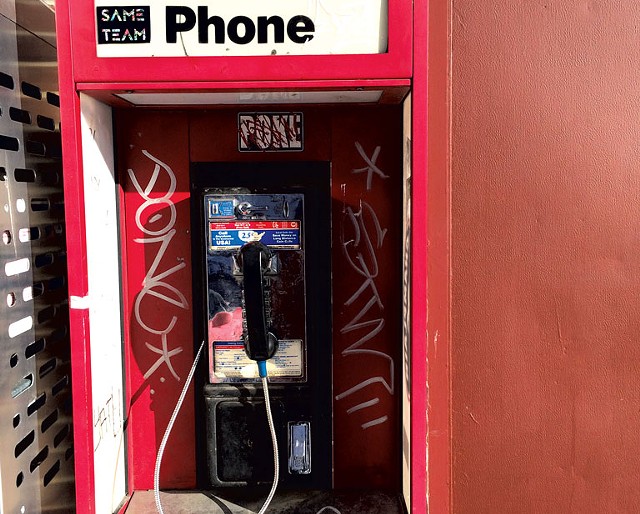
A reader emailed recently with a complaint about the Queen City: He couldn't find a single pay phone in its precincts.
A millennial might ask, why would Burlington still have pay phones? Given the ubiquity of cellphones, wouldn't telecommunications companies be crazy to continue operating public booths known primarily for attracting graffiti and prank calls?
But the questioner had an interesting point: His cellphone plan doesn't cover international calls, so he depends on pay phones to dial Montréal. With Burlington so close to the border, Canadian tourists may encounter the same problem. The city is also home to a number of New Americans who make calls abroad.
According to the Pew Research Center's Internet & American Life Project, 10 percent of adults don't have cellphones. Surely Burlington could sustain at least a few public phones for their sake. Seven Days set out to determine whether Vermont's largest city was truly devoid of this classic mode of communication.
Burlington's director of public works, Chapin Spencer, explained that his department doesn't deal with pay phones. The Clerk/Treasurer's Office is charged with doling out "encumbrance permits" to phones erected in the public right of way, but staff reported that their office had no permits on file. The Vermont Public Service Department doesn't keep track of the city's pay phones, either.
Not even firm statewide figures are available. The Federal Communications Commission counted 1,664 pay phones in Vermont in 2008, but it stopped collecting state-level data after that.
The American Public Communications Council, a trade association that represents most independent pay-phone companies, keeps a database of the phones its members maintain. When CFO and treasurer Deborah Sterman checked the database last week, she found just 12 working phones in all of Vermont.
The actual total is likely higher, but, judging by the national trend, it's safe to assume that Vermont's pay-phone population has dwindled. In 2014, the FCC counted roughly 150,000 pay phones nationwide — down from some 700,000 in 2008, and from more than 2 million in 2000.
Having failed to get a clear answer by the bureaucratic route, I set out on foot and ambled around Burlington, following leads based on the vague recollections of other Seven Days staffers.
First stop: Chittenden Superior Court on Main Street. A guard scoffed good-naturedly: "Good luck finding one of them!" But a moment later, he remembered that there used to be a phone just up the street, outside the Champlain Farms convenience store.
The phone is still there, the black receiver hanging under a sign that reads "Phone." It looks shabby and is covered with careless graffiti, but it produces a robust dial tone. Inside, the employees behind the register said they had no idea whether anyone used it.
Later, I called the company that owns the phone, MBE Coin Phone Systems. A woman picked up. When asked how many pay phones MBE maintains in Vermont, she said, "Very few" and declined to provide more specific information. "They just keep taking them out and taking them out and taking them out," she told me. Why? "Pay phones aren't profitable."
Next, I checked out Church Street. Standing sentry right outside Burlington City Hall was another phone. Local calls cost 50 cents. A bright yellow sticker advertised "free calls," which included numbers for companies promising to help callers find a job and get a credit card. I dialed *10 for God's Blessings/Daily Prayer. A surly woman answered. Over the crackly connection, all I could surmise was that she worked for a Christian television station and would not be giving me any benedictions today.
Calls to the company responsible for the phone, Pacific Telemanagement Services, were even less fruitful. No one picked up. The California company bought up many of Verizon's and FairPoint Communications' public phones several years ago and is now reportedly the largest independent pay-phone operator in the country.
In a 2012 interview with USA Today, PTS CEO Thomas Keane said, "We're sort of the last guy standing on pay phones." Keane claimed it takes only two to three calls per day to make a phone profitable, then told the paper, "There's an enormous growth of people below the federal poverty line. This is not anything that makes me sleep better at night, but our business is [from] people who have literally scraped two coins together."
During the 30 minutes that I observed the city hall pay phone, it failed to attract so much as a glance from dozens of passersby. Several people walked so close to the stand that I half expected them to collide with it.
Just as I was about to turn in for the day, I ran into a friend who, for someone in her late twenties, is surprisingly fond of pay phones. She pointed out that, outside the city, they're useful for reasons besides poverty and international calling. When she first moved to Vermont, her cellphone didn't get service in her home of Waitsfield, so she relied on the town's pay phones. When she got a job interview, she had her future employer use one to call her.
My friend directed me to the only other pay phone she knew of in Burlington — outside the Cumberland Farms convenience store on Pine Street. I picked up the receiver but was met with silence.
Given the difficulty of finding them, we make no claim to have conducted a comprehensive survey of Burlington pay phones.










Comments (3)
Showing 1-3 of 3
Comments are closed.
From 2014-2020, Seven Days allowed readers to comment on all stories posted on our website. While we've appreciated the suggestions and insights, right now Seven Days is prioritizing our core mission — producing high-quality, responsible local journalism — over moderating online debates between readers.
To criticize, correct or praise our reporting, please send us a letter to the editor or send us a tip. We’ll check it out and report the results.
Online comments may return when we have better tech tools for managing them. Thanks for reading.